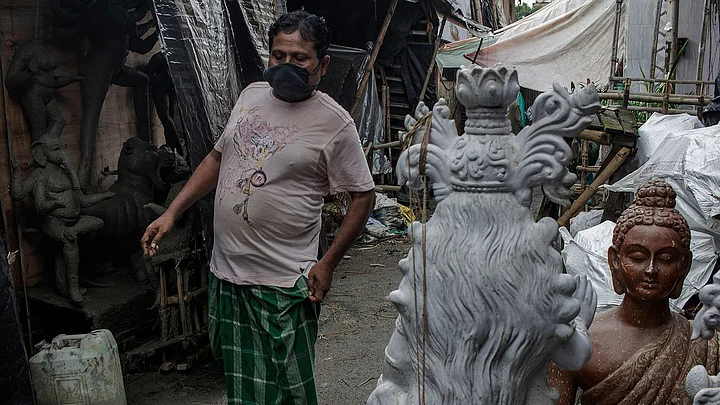Durga Puja is here, although the COVID-19 pandemic has dampened spirits and rained on the festive parade this time. The pandemic and decisions made by the Central and State governments in view of it have ensured a further economic slump, with daily wage workers being among the worst affected. The recent migrant exodus is proof. Furthermore, COVID-19 has ensured that those who sustain themselves by making an annual livelihood during this festive season are pushed further into poverty.
The best way people can save themselves from this illness which doesn’t yet have a cure or vaccine is by avoiding crowded areas – maintaining physical distancing. As a safety measure, amid fears of a COVID surge in West Bengal this Durga Pujo, the Calcutta High Court disallowed the masses from entering pandals – with only respective pujo committee organisers being allowed inside.
This is perhaps the first in recent memory that Durga Pujo in Bengal is seeing part-empty streets, with few daring to go out. All of this is bound to have a cumulative effect on the sculptors of Kumortuli – the goddess-makers – who depend on this grand street festival for their annual earnings. There have been fewer orders for Durga idols, or in many cases, the idols have been scaled down – which has put the artists of Kumortuli in great financial risk.
Sukumar Paul, a clay artist of Kumortuli, told this reporter that they have been making idols for a few generations now.
But this year they have not been able to earn the way they used to. They have not received enough orders to earn a substantial living. This is not his concern alone.
I met another clay artist, Mohan Shaw, who said he used to get orders very often throughout the year for various small or medium idols, but his main source of income was Durga Pujo.
At the time of writing this article, he had not received any orders for large Durga idols. Basudeb Paul, another artist at Kumortuli, reiterated the same. He lamented that since there are few big orders this time for Durga Pujo, many artists are bound to face severe financial difficulties.
This is not just about the clay artists – various labourers who look forward to the biggest festival in Kolkata are going to find themselves out in the cold. From clay artists, decorators, to labourers and hawkers – many are bound to make huge losses this Pujo.
Surajit Chakraborty and his family have been working as decorators for the last 70 years in North Kolkata. At the time of writing this piece, he said he had received all but no Pujo orders this year.
“Every year, from the day of Mahalaya, Kumortuli is frequently visited by countless people including school kids, couples, photographers, hawkers. Like this, various tea stalls, fast food corners could earn a lot during this time of the year. But Kumortuli appears to be a completely different place this year,” said a tea seller.
Besides, many labourers used to come to Kumortuli from different parts of West Bengal to carry the idols from the studio to the pandals. But since the size of the idols are comparatively smaller this year, these labourers’ earnings have also been put into jeopardy.
While we may consider this festival a reason for celebration, many people are completely or majorly dependant on the festival for their living.
Durga Pujo is a source of strength for many who fight the odds of life everyday. And today, they are afraid that their fight is going to be that much harder in the near future due to the collapse of this festival this pandemic year.
(The author is a Kolkata-based photojournalist. Views expressed are the author’s own. The Quint neither endorses nor is responsible for them.)
(At The Quint, we question everything. Play an active role in shaping our journalism by becoming a member today.)
